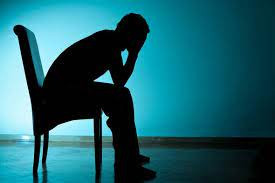
Mental health is a state of well-being in which an individual realises his or her own potential, can cope with the normal stresses of life, can work productively and fruitfully, and is able to make a meaningful contribution to their community.
Mental health is a critical component of individual, family, community and national wellbeing and prosperity.
Although men are three times as likely to die by suicide, men are less likely to be diagnosed with depression which is commonly linked to suicide.
It is estimated that fewer than 15% of men with anxiety ever access appropriate mental health care.
We are failing our men.
As we reflect on men’s health this month of November, may we reflect on how our families, communities and our healthcare systems can take better care of our grandfathers, fathers, brothers, husbands and sons, friends and colleagues.
What puts men at risk of depression?
- Genetics, family dynamics and difficult childhoods: men with a first degree family member (a sibling or a parent) who has depression will be two to three times more likely to develop depression themselves. Besides this genetic risk, growing up in dysfunctional, psychologically and physically unsafe homes where a young man is exposed to violence, disharmony, abuse or neglect can also increase risk of depression later in life.
- Difficulties recognising, expressing and managing difficult emotions: some men may struggle to recognise when they are getting stressed or overwhelmed, they may struggle to express what they are feeling verbally and reach out to others. Sadly, in many families and communities, the only acceptable emotion for men to express is anger. This can increase the risk of developing depression and other mental health challenges.
- Societal pressure: men are often under incredible pressure to be self-reliant, stoic and invulnerable. Men are often under societal pressure to provide financially and may often be valued more for what they can provide than for who they are. This pressure to ‘hustle’ and provide against all odds can increase risk of depression.
- Poor social support systems: men often struggle to form strong relationships where they can be emotionally authentic and vulnerable, this limits the strength of social support networks and can lead to social isolation. Marital or relationship difficulties can often worsen this sense of isolation.
- A loss of hope and a sense of purpose: financial difficulties, difficulties getting employment or losing a job can affect a man’s sense of self-esteem and self-worth. This can diminish a man’s sense of purpose and meaning in life, can lead to depression and other mental health problems.
What does depression look like in men?
- Mental health must be a priority at our workplaces
- ‘Art therapy critical in combating mental disorders’
- Be ethical, Potraz tells content creators
- How HR can effectively handle employee depression
Keep Reading
Studies have shown that depression may look different in men and these symptoms may not be as easily recognisable as depression symptoms in women. This may lead to under-diagnosis of depression in men.
- Frustration, irritability, anger and aggression: some men may struggle to express many emotions and may be socialised to act out and be aggressive rather than to express sadness, show grief or to allow themselves to cry or be tearful. When experiencing depression, some men may become easily frustrated, may become irritable more often, may struggle with managing their anger and feel excessively aggressive. This may then result in hostile treatment of others, harsh words and sometimes even violence in homes which unfortunately can result in further social isolation and worsening of the depression.
- Different language to express depression compared to women: Men will often say they are stressed, or tired, under pressure or on auto pilot rather than saying they are sad, overwhelmed or depressed. The language used in diagnostic tools for depression is also often better suited to the symptoms experienced more by females and men may not identify easily with these terms. Emotions such as anger and frustration are often not included in diagnostic tools, neither are behaviours such as aggression and alcohol and substance misuse and these are the more common presentations of depression seen in men.
- Alcohol and substance misuse: While alcohol and substance use can be mental health problems on their own, misuse of substances can be an outward expression of deeper problems like depression or anxiety. Alcohol and substances can sometimes be used to ‘self- medicate’ the emotional pain, sadness, insomnia and hopelessness of depression. Alcohol and substances can be used to try and build up bravado or self-esteem or to overcome anxiety or cope with helplessness. Unfortunately, when a man starts to misuse alcohol and substances to try and cope with depression they will often be misunderstood. They may be further stigmatised as alcohol and substance abuse is often misunderstood as a moral failure. This can make it even harder for men struggling like this to get the help that they need.
- High risk behaviour: Depression in men may manifest as high risk, self-destructive behaviour. This can be seen as speeding while driving or sometimes as road rage. Some men may engage in risky sexual behaviour. Some may engage in high-risk investments. Some men may engage in escape behaviour in mistaken attempts to deal with their emotional pain. This may be excessive spending or extramarital affairs and cheating.
- Emotional numbness and detachment: Depression can cause some men to struggle to connect with others emotionally. They may feel emotionally numb, unable to feel emotion and to express emotions. They may become emotionally detached from friends and family and this may result in breakdown of relationships and a deepening of the feeling of isolation again making it difficult to reach out for help.
- Avoidance behaviour and overworking: Some men with depression may recognise that they maybe struggling emotionally but will tend to avoid the problem, they may avoid talking about or avoid any deep conversations that may address the challenges. Some men may bury themselves in work (over-working). Working excessively is often rewarded in society so this may make it harder to recognise this as an avoidance behaviour which may be rooted in depression.
- Suicide: Up to 800 000 people die from suicide each year globally and sadly, men are three times as likely to die by suicide compared to women. More women attempt suicide, but more men actually die by suicide. Men with depression are less likely to be diagnosed and managed appropriately due to a number of reasons and thus can sadly turn to suicide to end their emotional pain even though help is available.
How can the family, community and the healthcare system safeguard the mental wellbeing of men?
- Families: families can safeguard the psychological wellbeing of boys. Families are can work to create psychologically safe environments where men are safe to be emotionally vulnerable when they need to be without fear of embarrassment or ridicule. Families can create a culture of valuing men for who they are not just for what they can provide for the family.
- Communities: community based programs to promote mental health awareness among men, positive role models of masculinity, decrease loneliness and decrease maladaptive ways of coping such as alcohol and substance use
- Healthcare systems: health workers need to acknowledge the gender differences in how depression is experienced and overcome common biases that men are less likely to experience depression. Screening for depression in men can be better aligned to the experiences of men with use of tools such as the Male Depression Risk Scale (MDRS) to better identify depression in men.
If you think that you or a man that you know may be struggling with depression, please contact your nearest health care provider and get help.
*Dr Chido Rwafa-Madzvamutse is a consultant psychiatrist. Feedback on WhatsApp: +263714987729; LinkedIn: https://www.linkedin.com/in/chido-rwafa-madzvamutse-53529259/ ; Facebook: https://www.facebook.com/chido.rwafa










